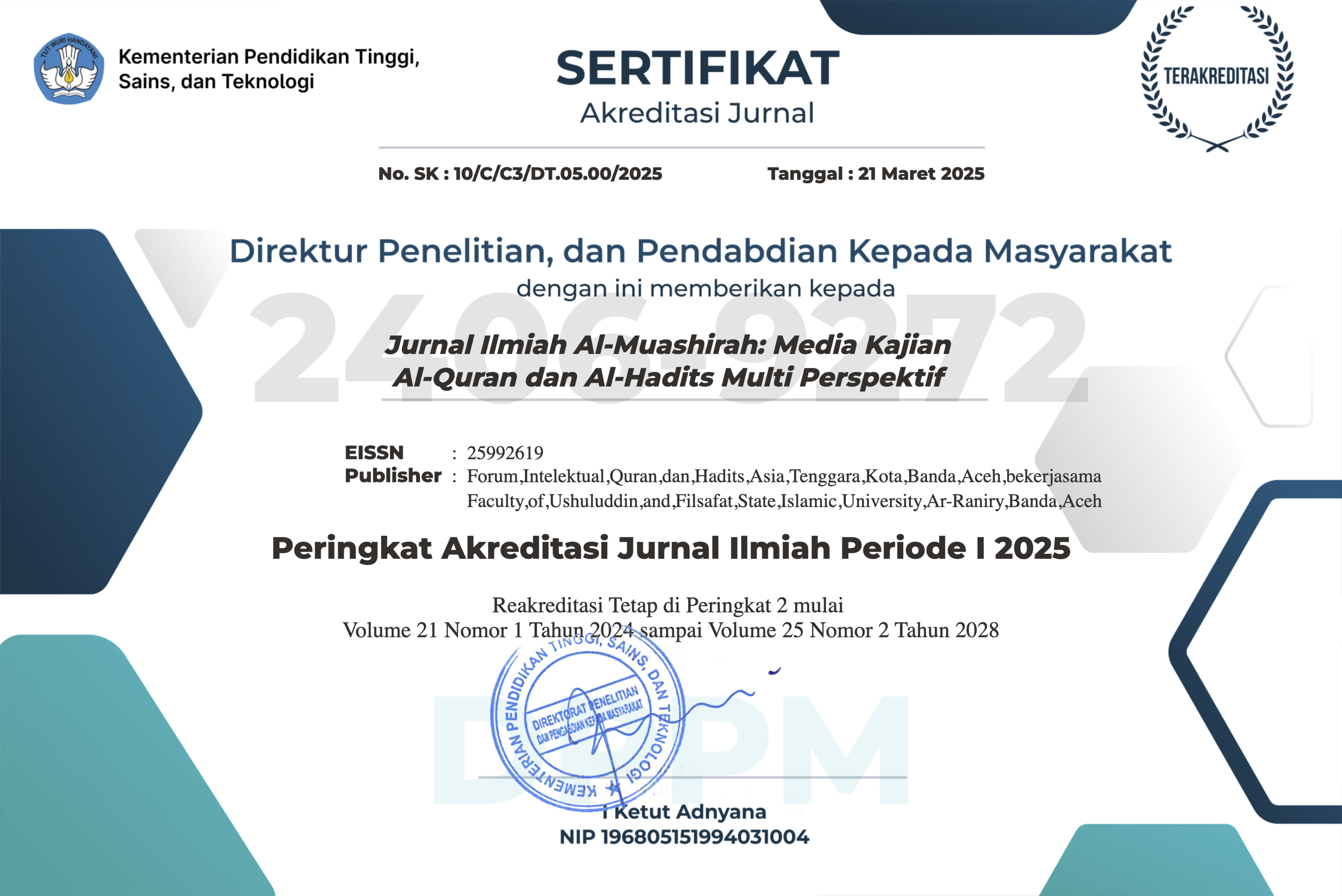Tafsir Scholar's View on Black Magic
DOI:
https://doi.org/10.22373/jim.v20i1.17287Keywords:
Black Magic, tafsir, Al-Qur’an, HadithAbstract
This study aims to discuss black magic (sihir) from the perspective of Tafsir scholars. The method used in this article is literature review with a hermeneutic approach, also known as tafsir maudhu'i. With this method, the author conducts various steps, including collecting literature and verses with the theme of magic in the Quran, collecting hadiths with the theme of magic, and also using dictionaries as tools to find the etymological use for black magic. The results of this study show that the tafsir scholars have agreed on the sinful practice of black magic, so they suggest staying away from themselves, their families, and loved ones rather than this great slander and harm that has swallowed up many people. Even if we are rich and happy because of black magic, it really is not comparable to the poverty and suffering that will be accepted in the hereafter.
Downloads
References
Abdissalam Baali, Wahid bin, ‘Sihir Dalam Pandangan Al-Qur’an Dan As-Sunnah (Pendapat Para Ulama) | Almanhaj’ <https://almanhaj.or.id/974-sihir-dalam-pandangan-al-quran-dan-as-sunnah-pendapat-para-ulama.html>
Abdulhameed, Sultan, Al-Qur’an Untuk Hidupmu (Jakarta: Zaman)
Abdullah, Samudi, Takhayul Dan Magic Dalam Pandangan Islam (Bandung: Al Maarif, 1997)
Al-Alusi, Mahmud, Ruhul Ma’ani Fi Tafsir Al-Quran Al-Azhim Wa As-Sab’i Al-Matsani (Beirut: Dar Ihya AtTurats Al-Arabi)
Al-Ashfahani, Ar-Raghib, Al-Mufradat Fi Gharibil Quran (Jawa Barat: Pustaka Khazanah Fawa’id, 2017)
Al-Asqalani, Ibnu Hajar, Fath Al-Bari Bisyarhi Shahih Al-Bukhari (Jakarta: Pustaka Imam Asy-Syafi, 2017)
Al-Athar, Abdul Kholiq, Menolak Dan Membentangi Diri Dari Sihir (Bandung: Pustaka Hidayah, 1996)
Al-Azhari, Muhammad bin Ahmad, Tahzdib Al-Lughah (Beirut: Dar Ihya At-Turats Al-Arabi, 2001)
Al-Bustani, Buthrus, Muhith Al-Muhith (Beirut: Maktabah Lubnan, 2008)
Al-Hakami, Hafizh bin Ahmad, Ma’arijul Qabul Syarh Sullam Al-Wushul (Dammam: Dar Ibnu Al-Qayyim, 1990)
Al-Jashshash, Ahmad bin Ali, Ahkam Al-Quran (Beirut: Dar At-Turats Al-Arabi)
Al-Jeraisi, Khalid, Al-Hadzru Min As-Sihr (Riyadh: Muassasah Al-Jeraisi, 2008)
Al-Qarafi, Syihabuddin, Anwar Al-Buruq Fi Anwa’ Al-Furuq (Kairo: Dar As-Salam, 2006)
Ar-Razi, Fakhruddin, Tafsir Al-Fakhr Ar-Razi (Beirut: Dar al-Fikr, 2005)
At-Taftazani, Sa’duddin, Syarh Al-Maqashid (Kairo: Al-Maktabah Al-Azhariyah li At-Turats, 2016)
At-Tahanawi, Muhammad Ali, Mausu’ah Kasysyaf Ishthilahat Al-Funun Wa Al-Ulum (Beirut: Maktabah Lubnan Nasyirun, 2006)
Faris, Ahmad Ibnu, Maqayis Al-Lughah (Damaskus: Ittihad Al-Kitab Al-Arab, 2002)
Khaldun, Abdurrahman Ibnu, Muqaddimah Ibnu Khaldun (Kairo: Dar Nahdhah Misr, 2012)
Majma’ Al-Lughah Al-Arabiyah, Al-Mu’jam Al-Wasith (Kairo: Maktabah Asy-Syuruq Ad-Dauliyah, 2011)
Manzhur, Muhammad Ibnu, Lisanul Arab (Beirut: Dar Shadir)
Qudamah, Abdullah Ibnu, Al-Mughni Li Ibni Qudamah (Kairo: Maktabah Al-Qahirah, 1969)
‘Sihir Dalam Pandangan Al-Qur’an Dan As-Sunnah (Pendapat Para Ulama) | Almanhaj’ <https://almanhaj.or.id/974-sihir-dalam-pandangan-al-quran-dan-as-sunnah-pendapat-para-ulama.html>
Downloads
Published
Issue
Section
License
Authors who publish in Jurnal Ilmiah Al-Mu'ashirah agree to the following terms:
- Authors retain copyright and grant the journal right of first publication with the work simultaneously licensed under a Attribution-ShareAlike 4.0 International (CC BY-SA 4.0) License that allows others to share the work with an acknowledgment of the work's authorship and initial publication in this journal.
- Authors are able to enter into separate, additional contractual arrangements for the non-exclusive distribution of the journal's published version of the work (e.g., post it to an institutional repository or publish it in a book), with an acknowledgment of its initial publication in this journal.
- Authors are permitted and encouraged to post their work online (e.g., in institutional repositories or on their website) prior to and during the submission process, as it can lead to productive exchanges, as well as earlier and greater citation of published work (See The Effect of Open Access).













